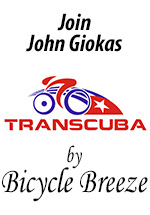October 14/03 8:05 am - Hamilton Worlds Final Report Card
Posted by Editor on 10/14/03
2003 Road Worlds Final Grade
By Rob Jones, Editor
This report made possible by Human Kinetics Publishers.
This is the final report card for the Hamilton Road World Championships. in my first report card, back in the spring, I assigned a grade of B Minus, and two weeks before the start of the event, the grade improved to a B. Now, it is time for the final grade. As previously, grades are assigned for key aspects of the event and organization, followed by the overall grade.
Course: A+ (previously an A+)
While the fields of competitors did not break up as much as expected, the course can not be faulted. Teams rode defensively, with few riders willing to stick their neck out at the front of the race. Strong winds along the upper portions of the course, particularly in the time trials, were harder on the riders than the climbs.
Spectators lined the course, and the scenery was spectacular, with Hamilton Mountain awash in colours of gold, yellow and red from changing leaves. Of course, the incredible weather did not hurt at all.
Finances: B (previously a C+)
This grade is difficult to assign, since the final numbers won't be in until at least the end of October. All along, the organization has struggled - first with slow funding commitments from the province, and then disappointing levels of sponsorship and a long delayed merchandising program.
However, according the organization C.O.O. (Chief Operating Officer), Neil Lumsden, all financial commitments will be met, and merchandising and ticket sales beat projections, leading him to predict a profit for a cycling legacy (more on this, below).
This in itself is a strong accomplishment, which leads one to wonder what could have been done if the organization could have started earlier. The merchandising program in particular could have benefited with more lead time, since product arrived barely in time for the event (and some items ran out halfway through the week). The web store never did add international sales - it still says Coming Soon! How much more could have been added to the bottom line if this had gotten on track? The Expo area was also under-subscribed, and a number of cycling companies said that they were never contacted.
Overall, the final few weeks showed what could have been accomplished, and the missed opportunities. This is frustrating and unfortunate.
Management: A (previously an A-)
This is one area in which the organization just kept getting better and better. In the final few weeks of such a large scale event, it quickly becomes apparent whether an organization can operate effectively or not.
The core staff were augmented by extra staff, volunteers and members of the cycling community (it looked like everyone who has been involved in Canadian cycling for the past four decades ended up pitching in) as the event started, and there were remarkably few glitches. In fact, one of the biggest problems was a short term difficulty in producing results by Tissot - the professionals in this area!
Logistics: A (previously a B+)
We knew that the road closure organization would work, based on the Canadian Road Nationals, and the late addition of GO train service from Toronto certainly helped (although, more and earlier trains would have been better). However, the real test would come with such things as the Accreditation Centre, volunteer management, security and - the big one - the media centre.
Accreditation ran extremely smoothly (Brian Groos, who has been involved in Accreditation for Olympics and other major events, came on board in August, and did a stellar job). Likewise, the volunteers were motivated, knew their jobs, and managed to accomplish their often thankless task with a smile for everyone. Hamiltonians really shone here.
Security was as good as other Worlds, although at times guards seemed confused as to who was and wasn't allowed in certain areas - a guard tried to tell my motorcycle driver and I that we weren't allowed on the course - very politely. We responded that he should check with his supervisor, and after half a dozen radio conversations it was all sorted out, with many apologies. Contrast this to the recent Mountain Bike World Championships in Lugano, Switzerland, where photographers had regular screaming matches (and in some cases physical confrontations) with security and volunteers.
The media services rated an A+; certainly the finest I have ever had at a world championships. Even the notoriously picky UCI Press Officer, Enrico Carpani, declared them to be the finest he has seen. The European journalists were in awe, and we had to quickly disabuse them of the notion that we always had facilities like this. In future years, we may fondly reminisce about the Hamilton press room . . .
Special thanks to the Press Officer Paul Gaines and his staff.
Communications: B+ (previously a D)
The only thing holding this back from an A grade, is how late everything got on track, and the announcing. Communications has been a weakness with the organization from the beginning, with the initial grade an F. In the final week leading up to the event, and during the event itself, everything was excellent.
As has already been mentioned, the press services were stellar. During the event, updates from the organization were timely, and queries were answered immediately, or an answer was found as quickly as possible. As an example, after the Genevieve Jeanson "Unfit to Race" announcement was made, a press conference was held at the end of the day, and the organization had a background paper on hematocrit testing ready for the mainstream journalists who were unfamiliar with the process.
The event website was updated regularly - something that, sadly, often doesn't happen once events are underway. It was not meant to take the place of regular media outlets, but they did provide event summaries, results, photos and upcoming activity schedules.
The announcing on site was spotty, unfortunately for the spectators. There were long gaps when nothing was said, and then information that was confusing, incomplete (or plain wrong) would suddenly be blurted out. The primary announcer was brought in for his expertise in cycling, however, he seemed confused at times, and his English was, frankly, not up to the required level. The Canadian announcer, Louis Bertrand, was much better, but didn't get much air time, unfortunately.
The television feed made up for this, where spectators could see the raw feed from the TV bikes and the helicopters on big screens around the course. CBC should be commended for their coverage here and, in fact, even the Belgian television crews present were impressed by the depth of coverage.
Legacy: B- (previously a D)
This grade is somewhat optimistic, and is based partially on the expected profit announced by C.O.O. Neil Lumsden. The organization (and Heritage Minister Sheila Copps, in an interview that will appear shortly) has avoided making any specific promises in this area for a long time, talking instead vaguely about exposure to the sport and 'touchy-feelie' memories. Given the financial concerns, this was all that they could do.
IF there is a profit, AND if it is reasonably substantial, then a respectable legacy MAY result. However, note the if's, and's and may's . . . It is to be split between the Canadian Cycling Association and the Hamilton-based National Cycling Centre.
Memories are good, but what is needed is a Centre and facilities where the kids who got excited about this event can be directed. I remember a lot of people got excited after Steve Bauer won his Olympic silver in 1984. It did not translate into a huge surge in bike racers, partially because there was nowhere for them to be directed to.
We will be watching very, very closely to see what happens to this legacy, and if it will be used to build on the terrific boost cycling just received in Hamilton last week.
Final Grade: A- (previously a B)
The organization, the city and the people of Hamilton pulled it off. After a slow start, marked by squabbling among funding partners and, to be blunt, some alarming chaos at the organizational level, they managed to put on one of the best run World Championships I have attended (and my first Worlds was in 1974). They overcame the considerable disadvantage of not being in Europe (where governments roll out the red carpet for cycling), listened to experts, and, quite frankly, wowed many of my European colleagues.
Thank you. You did us proud.
| Return to Canadian Cyclist homepage | Back to Top |





